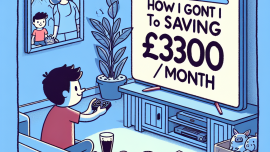
How to Set Financial Goals When You Have No Idea Where to Start
How to Make a Budget That Actually Works (and Doesn’t Make You Miserable)
Let’s be honest—just reading the word “budget” probably made your eyes glaze over a little. Don’t worry, you’re not alone. For most of us, budgeting sounds about as exciting as watching paint dry. But here’s the deal: if you want to win with money, you *have* to know where it’s going. And no, “vibes” are not a financial strategy.
I’m Thomas “Tom” Bradley, and I’m here to help you build a budget that’s so easy it almost runs itself—and I promise it won’t suck the joy out of your life. Whether you’re just getting started with your finances or you’ve tried budgeting before and gave up halfway through the month (we’ve all been there), this guide is for you.
What Is a Budget, Really?
Before we get into the “how,” let’s talk about the “what.” A budget is just a plan for your money. That’s it. It tells your cash where to go instead of wondering where it went. The goal isn’t to restrict your life—it’s to give you more freedom. Football teams don’t go onto the field without a game plan, right? Your money shouldn’t either.
The Problem with Most Budgets
Most people mess up budgeting because they try to make it perfect. They want beautiful spreadsheets, exact categories, and months planned out in advance. But life doesn’t work that way. Expenses pop up, income changes, and if your budget is too rigid, it’ll crumble faster than a cheap lawn chair.
Step-by-Step: Build a Budget That Works for Real People
Here’s the step-by-step blueprint I give to every budgeting rookie. No fluff, no math degree required—just real talk and practical action.
Step 1: Know Your Take-Home Income
Don’t start with your salary. That’s not what you actually take home. Look for your net pay after taxes, retirement contributions, and other deductions. If you have multiple jobs or gig income, add everything up. This is your starting point—the pot of gold you’re working with each month.
Step 2: List Your Non-Negotiables
There are expenses you absolutely have to cover to survive. I call these the Four Walls:
- Housing – Rent, mortgage, property taxes, etc.
- Utilities – Electricity, water, heat, internet. Yes, internet counts… it’s 2024.
- Food – Groceries, not daily lattes with oat milk.
- Transportation – Fuel, bus fare, car payments—whatever gets you to work and back.
Total these up first. These are your financial oxygen mask—you can’t help anyone else (or buy anything fun) until these are secure.
Step 3: Track Variable, Lifestyle, and One-Off Costs
Now list every other place your money goes. Be honest. If you spend $120 on sushi every Friday night, write it down. Your budget shouldn’t be a fantasy—it should reflect how you *actually* spend.
Some common categories include:
- Subscriptions (hello, five streaming services)
- Dining out
- Clothing
- Personal care
- Health and fitness
- Entertainment
- Pets
Don’t forget irregular expenses too—birthdays, holidays, school fees, etc. If it happens more than once a year, plan for it.
Step 4: Assign Every Dollar a Job
This is called a zero-based budget, and it’s my go-to system. Every dollar you bring in needs to be assigned to a category—even if that’s savings or investing. Your income minus expenses should equal zero. That way, your money is working for you, not just floating around waiting to disappear.
If you make $3,000 a month, then $3,000 needs to have a place in your plan. Not $2,940. Every. Single. Dollar.
Step 5: Track as You Go
Here’s the part most people skip: you’ve got to track your spending. Otherwise, your budget is just a bunch of nice ideas. I recommend using an app (tons of free ones out there), a basic spreadsheet, or even a notebook. The method doesn’t matter. What matters is that you stay on top of it.
Update your budget weekly, even if it’s just for 10 minutes. That way, you avoid surprises and make adjustments as you go. Think of it like checking your gas gauge—you wouldn’t drive 500 miles without checking your fuel, right?
Common Budgeting Mistakes (And How to Avoid Them)
Even with a solid system, things can go off the rails. Here are a few common traps and how to sidestep them.
- Being too strict – Your budget should have wiggle room. Life happens. Build in a “fun” category, even if it’s just $50/month.
- Skipping the emergency fund – Start small. $500 in a savings account can be a game-changer when life throws a curveball.
- Budgeting off your gross income – Always budget based on take-home pay.
- Not checking in – Budgets aren’t “set it and forget it.” They evolve with your goals and life. Adjust as needed.
Don’t Forget to Reward Yourself
When you stick to your budget for a full month, celebrate—even if it’s small. This stuff is hard, and you deserve some feel-good vibes. Maybe it’s a fancy coffee, a new plant, or an extra-long bubble bath. Budgeting isn’t about punishment—it’s about progress.
Budgeting Tools You Can Use
You don’t need fancy software to make this work—but if tech helps keep you accountable, try using these:
- Mint – Free and easy to use, great for beginners.
- EveryDollar – Built on zero-based budgeting principles.
- YNAB (You Need a Budget) – More advanced, but powerful for planning ahead.
Final Thoughts: Your Budget, Your Terms
Listen, I’m not here to turn you into some hyper-frugal money monk living on rice and beans (unless that’s your thing—no judgment!). I want you to have a life you enjoy *and* a future you’re proud of. The goal of budgeting isn’t deprivation—it’s direction. When you give your money a purpose, you gain control, reduce stress, and move toward your goals faster than you thought possible.
If you mess up? Try again next month. Progress, not perfection. You’ve got this.
Need More Help?
Want to learn more about how to master your money, crush debt, or build wealth from scratch? Check out our About Us page to learn more about Financeone, or get in touch via our Contact page. We’re here to help beginners become brilliant.









Leave a Reply